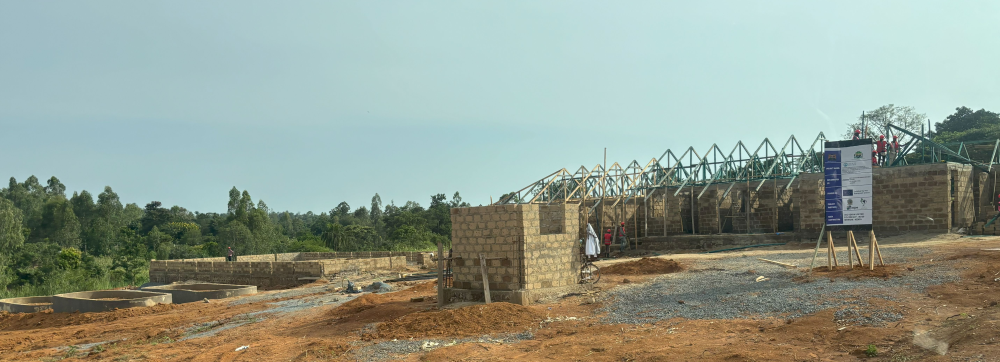The INNOECOFOOD project addresses the Farm2Fork approach to local production and marketing of sustainably produced food in Africa. The EU's Farm2Fork strategy aims to make the food system fair, healthy and environmentally friendly. These goals are promoted through the establishment and operation of so-called ECOHUBS and Living Labs. This involves combining innovative technologies in sustainable aquaculture for the production of fish and spirulina with the use of environmentally friendly practices in the production of insects as feed and protein sources, in combination with local innovation, knowledge transfer and economic empowerment of communities across Africa.
Solar-based drying and ice production technologies for improved to promote food security and ice production in Africa
INNOECOFOOD
Initial Situation
There is still a lack of sufficient, high-quality and hygienic food supplies in Africa, especially in rural areas. Local food production is a key factor here, as it avoids long transport routes and thus eliminates the need for costly preservation or conservation measures. At the same time, many customers prefer fresh products. This also applies to fish. Food produced sustainably using local resources and renewable energies is one way of ensuring long-term supply. At the same time, such concepts offer employment, income and training opportunities for the local population, especially women and young people.
Objective
Based on an inventory of aquaculture practices used by communities in local lakes and rivers (living labs), four sustainable and innovative rural ECOHUBS will be established, in which renewable energy will be used for the production, processing and marketing of aquaculture value chains (fish and selected spirulina species) and insect species in various African countries. The aim is to optimise the production of organically farmed fish (catfish and tilapia), sustainable feed and post-harvest technologies, as well as selected spirulina species and selected insect species. Adapted sensor technology using AI and IoT technology will be used to increase yields. Work is also being done on upgrading nutrients from fish waste and manufacturing new products from fish and by-products. Solar ice production for preservation, storage and transport, as well as solar-powered drying technologies, are used in various processing steps. The products will be evaluated on the basis of a validation of their nutritional and sensory quality, microbiological and chemical safety, consumer acceptance, life cycle analysis (LCA) and the introduction of certification systems. This is achieved using digital tools for in the processing of fish, spirulina and insect products as well as in for consumption, transparency, marketing and trade. To achieve these objectives, the work is accompanied by intensive training measures that focus on young people and women as trainers.

Result
Fraunhofer ISE's tasks mainly relate to the planning and design of systems for using renewable energies to generate heat and cooling at the ECOHUBS sites in Kenya and Ghana. The heat supply for the dryers installed there will be provided by innovative air-to-water heat pumps using propane as a refrigerant on the one hand, and by solar thermal energy on the other. Flake ice machines designed for direct solar operation without additional inverters and battery storage will be installed at both locations.
Project Partner
- Centro Interdisciplinar de Investigacao Marinha e Ambiental (CIIMAR), Portugal
- Kenya Marine and Fisheries Research Institute (KMFRI), Kenia
- Tanzania Fisheries Research Institute (TAFIRI), Tanzania
- Makerere University (MAKERERE), Uganda
- Council for Scientific and Industrial Research (CSIR-FRI), Ghana
- University of Namibia (UNAM), Namibia The Agricultural Research Center (CLAR), Egypt
- University of Dar es Salaam (UDSM), Tanzania
- Jomo Kenyatta University of Agriculture and Technology (JKUAT), Kenia
- Burdur Mehmet Akif Ersoy Universitesi (BMAEU), Turkey
- Denizli Valiligi (DENIZLI), Turkey
- The International Centre of Insect Physiology and Ecology LBG (ICIPE), Kenia
- B2E Associacao para a Bioeconomia Azul - Laboratorio Colaborativo (B2E), Portugal
- Sparky Social Enterprise Limited (SPARKY), Uganda
- Food Security for Peace and Nutrition Africa (FSPN-Africa), Kenia
- Innotech Ingenieursgesellschaft mbH (INNOTECH), Germany
- Fraunhofer Institut für Solare Energiesysteme (ISE), Germany
- Faculdade de Medicina Veterinaria (FMV), Portugal
- Mayfair Holdings Ltd (PECHE), Kenia
- NK Sustainable Bioproducts Ltd (NKSB), Great Britain
- JRC - Joint Research Centre - European Commission (JRC), Belgium
nicht entfernen!!
